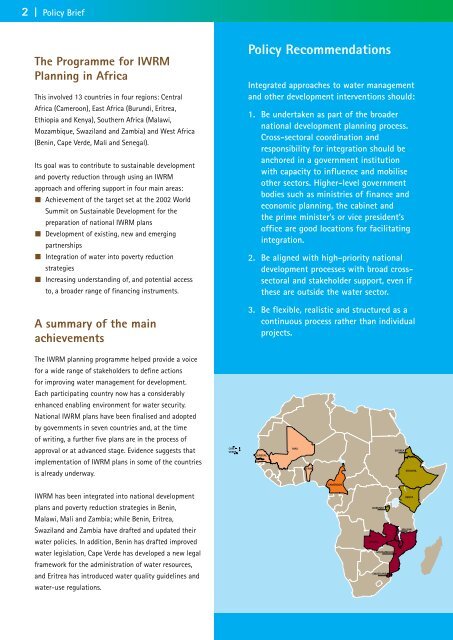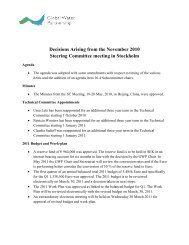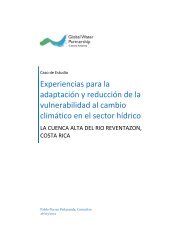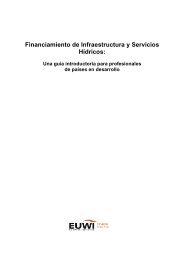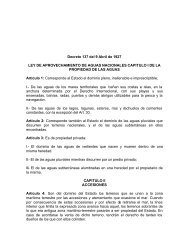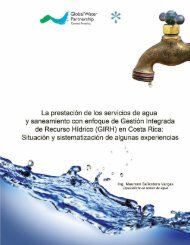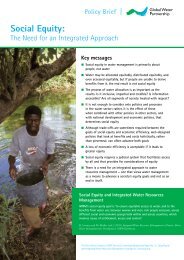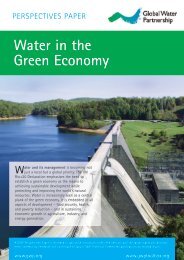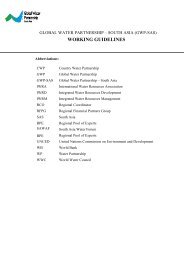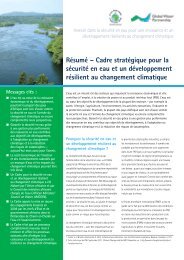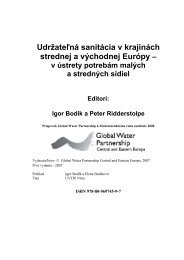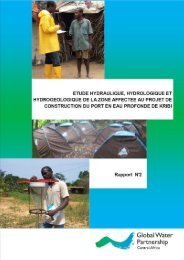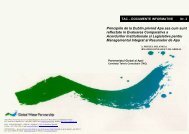Policy Brief - Global Water Partnership
Policy Brief - Global Water Partnership
Policy Brief - Global Water Partnership
You also want an ePaper? Increase the reach of your titles
YUMPU automatically turns print PDFs into web optimized ePapers that Google loves.
2 | <strong>Policy</strong> <strong>Brief</strong>The Programme for IWRMPlanning in AfricaThis involved 13 countries in four regions: CentralAfrica (Cameroon), East Africa (Burundi, Eritrea,Ethiopia and Kenya), Southern Africa (Malawi,Mozambique, Swaziland and Zambia) and West Africa(Benin, Cape Verde, Mali and Senegal).Its goal was to contribute to sustainable developmentand poverty reduction through using an IWRMapproach and offering support in four main areas:• Achievement of the target set at the 2002 WorldSummit on Sustainable Development for thepreparation of national IWRM plans• Development of existing, new and emergingpartnerships• Integration of water into poverty reductionstrategies• Increasing understanding of, and potential accessto, a broader range of financing instruments.A summary of the mainachievements<strong>Policy</strong> RecommendationsIntegrated approaches to water managementand other development interventions should:1. Be undertaken as part of the broadernational development planning process.Cross-sectoral coordination andresponsibility for integration should beanchored in a government institutionwith capacity to influence and mobiliseother sectors. Higher-level governmentbodies such as ministries of finance andeconomic planning, the cabinet andthe prime minister’s or vice president’soffice are good locations for facilitatingintegration.2. Be aligned with high-priority nationaldevelopment processes with broad crosssectoraland stakeholder support, even ifthese are outside the water sector.3. Be flexible, realistic and structured as acontinuous process rather than individualprojects.The IWRM planning programme helped provide a voicefor a wide range of stakeholders to define actionsfor improving water management for development.Each participating country now has a considerablyenhanced enabling environment for water security.National IWRM plans have been finalised and adoptedby governments in seven countries and, at the timeof writing, a further five plans are in the process ofapproval or at advanced stage. Evidence suggests thatimplementation of IWRM plans in some of the countriesis already underway.CAPEVERDESENEGALMALIBENINERITREAETHIOPIACAMEROONIWRM has been integrated into national developmentplans and poverty reduction strategies in Benin,Malawi, Mali and Zambia; while Benin, Eritrea,Swaziland and Zambia have drafted and updated theirwater policies. In addition, Benin has drafted improvedwater legislation, Cape Verde has developed a new legalframework for the administration of water resources,and Eritrea has introduced water quality guidelines andwater-use regulations.BURUNDIZAMBIAMOZAMBIQUESWAZILANDKENYAMALAWI


